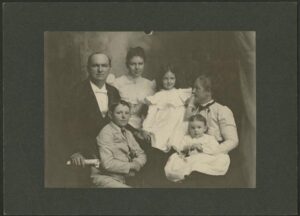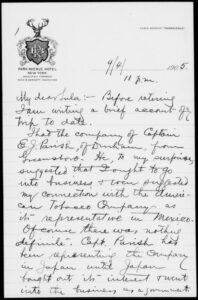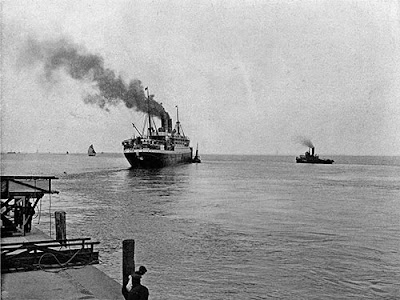Charles Duncan McIver had not been well. Although he was only 45, the years of hard travel, an indulgent diet, and the responsibilities of his role as founder and president of the State Normal and Industrial School had taken its toll. Those close to him were concerned about his health and suggested that a sea cruise might provide the rest and relaxation he would need to restore his strength.
In the summer of 1905, McIver began to finalize his plans for a trip to Europe. Accompanying him would be his friend, James Y. Joyner, a fellow University of North Carolina alumni. McIver and Joyner were part of a group that championed teachers’ education in North Carolina, holding training institutes across the state. In 1891, when the North Carolina legislature finally agreed to establish the State Normal and Industrial School, a state sponsored college for women, McIver took the helm as president and Joyner served as a professor, then head of the English Department. In the years after the school was established, Joyner left to pursue other endeavors, but McIver remained president with the constant pressures and responsibilities that came with the position.
McIver’s wife, Lula encouraged her husband’s trip with his college friend and agreed to spare him for what would be an eight week adventure, while she remained home caring for their four children. Lula was an educated woman in her own right and matched her husband’s intellect and energy. A Salem College graduate, Lula had studied medicine and was a committed supporter of women’s rights. They were a very devoted couple, conferring about all matters and writing copious letters during their many separations, as McIver often traveled for business. Yet, this trip would be different – it was longer and communication would be more tenuous. Overseas correspondence could take weeks to deliver and telegrams and telephone calls were costly. As his departure time drew near, the couple devised a code that could be telegraphed inexpensively (the charge was per word), serving as a short-hand to convey how they were doing. For example, “Alog” meant “We are well. How are you?” or “Comem” meant “Come home, Annie is sick,” etc. Promising to write every day, McIver set out on the first leg of his trip, a train from Greensboro to New York, the first week of September.
With a gregarious and engaging personality, McIver encountered many interesting acquaintances as he made his way north. He wrote to Lula the evening of September 4 (on Park Avenue Hotel stationery), telling her of meeting a Captain E. J. Parish of Durham, who suggested that he go into business for the American Tobacco Company. He was obviously flattered and intrigued by the thought of a career change. When he arrived in New York, he met with Mr. Mebane, who tried to persuade McIver to postpone his European trip and instead, stay in New York to discuss taking a job there. It is apparent by his letter that McIver was seriously pondering this offer, but it would have to wait until he returned. While he was in New York, McIver also had the opportunity to meet “Dr. Booker Washington,” likely referring to Booker T. Washington, the African American educator and orator, with whom he had a relationship through the Southern Educational Board.
Lula responded to her husband’s letters with relief and reports of the home front. These mostly included everyday household news of the children, visitors, and her attempts at campus maintenance. Many of her letters reflect her deep worry for his health. She writes, “Sweetheart, please please take care of yourself. It makes me so anxious to see you so sick and tired. I cannot rest.” She also begs him to watch his diet. McIver loved rich food and it was perhaps impractical to suppose that he would curtail his eating habits on a European cruise. She signed her letters affectionately with “lots of kisses from your loving wife.”
While in New York he met his friend, James Joyner, and finalized their travel plans. After considering several different ocean liner companies (including the White Star Line, which would later launch Titanic), they decided on the S. S. Blucher, of the Hamburg-Amerika Line. The friends booked first class passage and also purchased tickets for their return trip October 20, departing from Boulogne, France, and arriving in New York on October 28.
As the ship departed from New York, McIver took the time to quickly write a note to Lula “to say another goodbye,” assuring her that he was well and that his he liked his ship’s quarters very much. He signed the letter, “I love you Sweetheart, I tell you I do. Love to the dear quartet (his children Annie, Charlie, Verlinda, and Lula Martin). Affy (affectionately) your husband, Charles Duncan McIver.” And with this note, written at 11am, he began his European adventure.
Next week: McIver’s shipboard experience and his “Grand Tour” through Europe!
*Courtesy of GG Archives https://www.gjenvick.com
By Kathelene McCarty Smith



